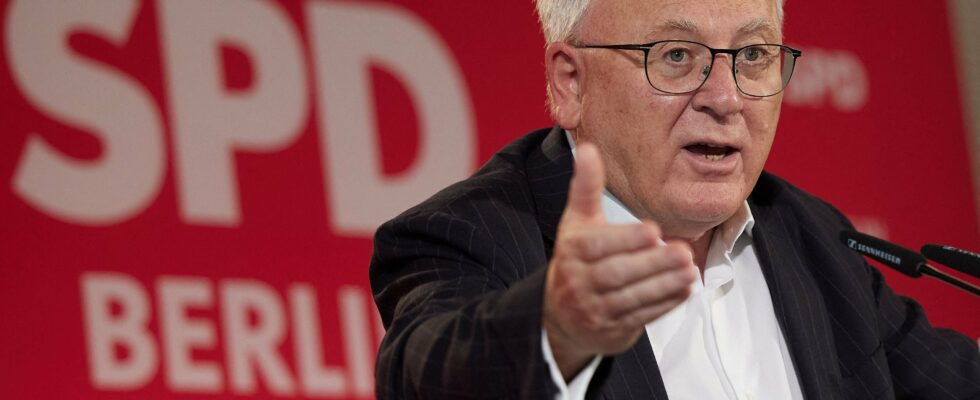While Eurosceptic parties risk making a spectacular breakthrough in the next Parliament, pro-Europeans are having difficulty convincing public opinion of the benefits of Europe. For the European Commissioner responsible for employment, social issues and integration, Nicolas Schmit, the EU primarily suffers from a lack of communication. For the man who is also leader of the Party of European Socialists (PES) in the elections, and main opponent to Ursula von der Leyen for the presidency of the European Commission, European sovereignty is not synonymous with the abolition of state sovereignty. .
L’Express: How do you explain the rise in the polls of populist and far-right parties almost everywhere on the continent?
Nicolas Schmit: We are, as rarely in contemporary history, victims of both a succession and a pile-up of crises over the past twenty years. This polycrisis has undermined social democracy. Let’s start with the financial crisis of 2008, transformed into a social and economic crisis. Then came the Covid pandemic, the war in Ukraine and finally, the energy crisis. We therefore live in a climate of uncertainty and instability which disorients populations. However, these feelings are used by the far right to fuel fear. Quite naturally, people turn towards those who have never exercised power with this reflex “why not them, after all…”.
Furthermore, I think that liberal policies in certain countries have strained purchasing power and undermined public services. And, here again, the citizens’ response is the same: “those responsible for the right, left or center are responsible, let’s try the others!”. Last explanation: the migration problem. We handled this issue poorly. And more specifically the integration of young people from the second generation, but also and especially from the third. Successful integration is achieved through active housing policies and educational policies. Let’s face it, we have failed on these issues.
You have been Commissioner for Employment, Social Affairs and Integration for five years. The European Union has done a lot for employment, particularly with financing partial unemployment during the pandemic. And yet, you and the institution you represent cannot capitalize on this success…
It’s true: Europe does not appear behind these projects. Without doubt, we are suffering from a communication problem! Citizens do not know that the EU helped save tens of millions of jobs during the pandemic by giving the financial means to many countries to implement a very generous partial unemployment system. All this thanks to the SURE program which is the first joint loan of the European Union, even before the major recovery plan of 750 billion euros. It’s a bit the same thing with regard to the minimum wage directive. Obviously, in France, where the minimum wage has existed for decades, this directive is quite invisible. So, yes, we have a communication problem but the media, which overweight bad news or systematically shine the spotlight on what is not working, also have their share of responsibility.
Will the battle for sovereignty – strategic, industrial, food – be the great battle of the future Commission?
Yes of course ! Because we live in an economic and geopolitical context where Europe risks being relegated to the second, or even third, division. We have only one solution: put more things together, in technology, in the defense industry. The notion of European sovereignty does not mean the abolition of state sovereignty. This means pooling, sharing a set of domains. Therein lies the real difference between pro-Europeans and those who defend tooth and nail a nationalism that goes against the grain of history. Their project is not to consolidate or repair a Europe, certainly imperfect, but to dismantle it. This is why they are so dangerous. And this is why the fight against the far right is so important.
Precisely, when we talk about “doing things together”, Emmanuel Macron defends the launch of a new large European loan to finance the construction of European defense. Is this audible to certain large countries, first and foremost Germany, when we know that the 27 have still not agreed on the terms of repayment of the previous loan?
Finding new financial resources to repay the previous large loan is one of the first missions to which the next Commission will have to focus. It’s true that we’ve been working on it for almost four years, with no results. But member states are sometimes contradictory. They agree in Brussels on a plan or a proposal and then refuse it when we go into details. Take the case of the financial transaction tax directive, it has been blocked for years. If the EU launches a new large joint loan, it is not the States that will be able to repay it. There is therefore an urgent need for the European Union to find new resources.
And on the social aspect, what should be the priority of the next Commission?
The first is to strictly ensure the strict transposition in each country of what was voted on in Brussels. This is particularly the case with the directive governing work on platforms or that on the minimum wage. Second, Europe must address the quality of public services. Their revaluation and strengthening are crucial. Because the lack of investment in recent years also partly explains the rise of the far right.
.
